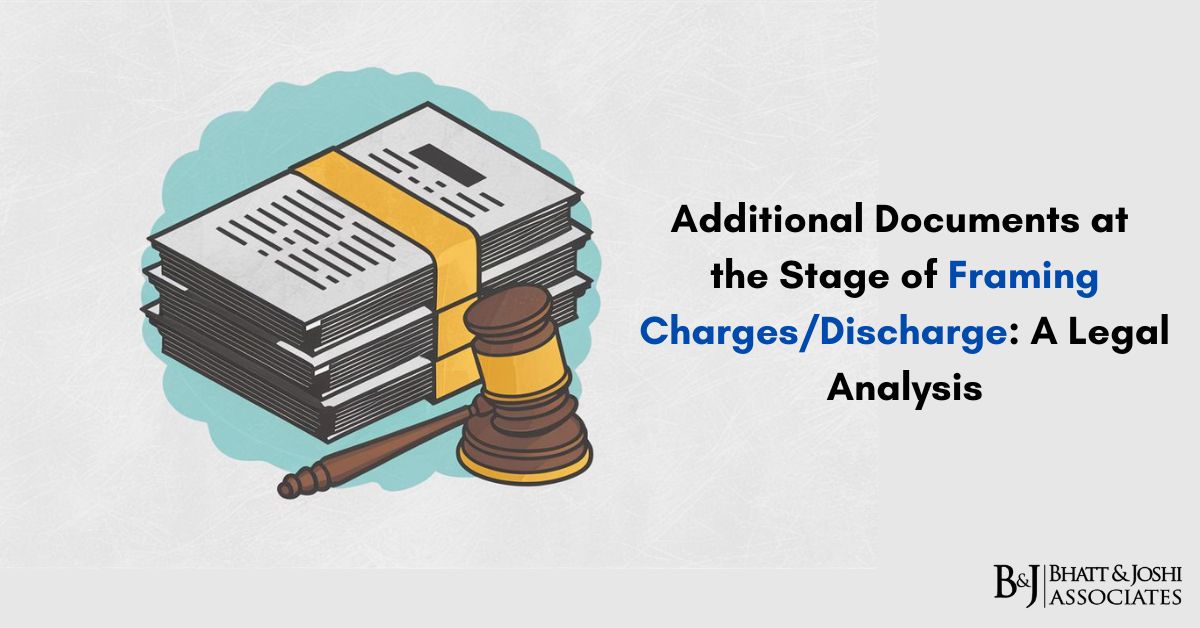Additional Documents at the Stage of Framing Charges or Discharge Applications: A Legal Analysis
Introduction
The consideration of additional documents at the stage of framing charges or discharge applications is a critical aspect of criminal procedure. This article delves into the legal provisions governing this stage, alongside key judicial pronouncements that shape the practice of whether the defense can present documents at this juncture.
Legal Provisions Related to Framing Charges or Discharge Applications
The relevant provisions of the Criminal Procedure Code (CrPC) concerning the framing of charges and discharge applications are:
– Section 227 CrPC: Pertains to the discharge of the accused by a Sessions Judge if there is no sufficient ground for proceeding.
– Section 228 CrPC: Instructs the judge to frame a charge if there is a ground for presuming the accused has committed an offense.
– Section 239 CrPC: Allows the magistrate to discharge the accused in warrant cases if the charge is groundless.
– Section 240 CrPC: Requires the magistrate to frame a charge if there is sufficient ground for presuming the accused has committed an offense.
Key Judicial Pronouncements
Several landmark cases provide clarity on whether additional documents can be considered at the stage of framing of charges or discharge under CrPC:
- State of Orissa v. Debendra Nath Padhi (2004) MANU/SC/1010/2004:
– Facts: The central issue was whether the trial court could consider material submitted by the accused at the stage of framing charges. The defense argued for the inclusion of exculpatory evidence, while the prosecution opposed this on the grounds that it would amount to a pre-trial examination of evidence.
– Held: The Supreme Court ruled that the accused does not have the right to produce any material at the charge framing stage. Only the prosecution’s documents under Section 173 CrPC can be considered. However, the Court recognized that the High Court has wide powers under Section 482 CrPC and Article 226 of the Constitution to prevent abuse of process or to secure justice.
- Rukmini Narvekar v. Vijaya Satardekar (2008) MANU/SC/8100/2008:
– Facts: This case involved allegations of fraud, with the defense seeking to introduce documents at the charge framing stage to demonstrate the prosecution’s case was baseless.
– Held: The Supreme Court held that while generally defense materials are not considered at the charge framing stage, the court can look into such materials if they convincingly establish that the prosecution’s version is absurd or concocted.
- Hardeep Singh v. State of Punjab (2014) MANU/SC/0057/2014:
– Facts: This case dealt with whether additional accused could be summoned based on evidence collected during the investigation and the trial.
– Held: The Supreme Court reiterated that at the charge framing stage, the court is primarily concerned with the material submitted by the prosecution. The defense can only produce documents if they meet the stringent criterion of proving the prosecution’s case as inherently implausible.
- Union of India v. Prafulla Kumar Samal (1979) MANU/SC/0070/1979:
– Facts: This case examined the principles to be followed while framing charges.
– Held: The Supreme Court laid down that while framing charges, the court must consider whether there is sufficient ground for presuming that the accused has committed an offense. The Court should not weigh the evidence meticulously but should see if there is a prima facie case.
- Sajjan Kumar v. Central Bureau of Investigation (2010) MANU/SC/1023/2010:
– Facts: In this high-profile case involving allegations of murder and conspiracy, the defense sought discharge on the grounds of lack of sufficient evidence.
– Held: The Supreme Court emphasized that the stage of framing charges is a preliminary one, and detailed examination of evidence is not required. The material brought forth by the prosecution, if sufficient to form a prima facie case, should lead to framing charges.
Analysis and Discussion
The consistent theme across these judicial pronouncements is the restrictive approach towards considering defense documents at the stage of framing charges. The courts aim to prevent a “mini-trial” before the actual trial. However, they recognize the High Court’s discretionary power to intervene in exceptional cases to prevent miscarriage of justice.
The principles laid down in these cases serve to balance the need for a fair trial with the necessity of preventing frivolous or malicious prosecutions. The accused’s rights are protected through the possibility of discharge if the prosecution fails to establish a prima facie case based on its material.
Conclusion: Key Insights on Stages of Framing Charges & Discharge
The issue of considering additional documents at the stage of framing charges or discharge is a complex interplay of legal principles aimed at ensuring justice. While the prosecution’s evidence forms the primary basis for decisions at this stage, the judiciary has carved out limited exceptions to safeguard against blatant injustice. This nuanced approach underscores the importance of maintaining procedural fairness while allowing meritorious cases to proceed to trial.
 Whatsapp
Whatsapp



